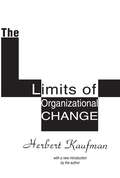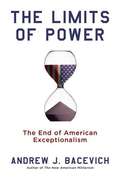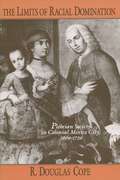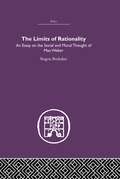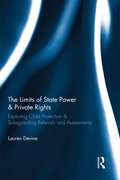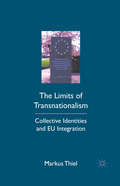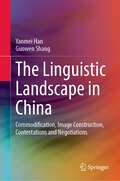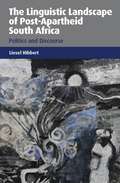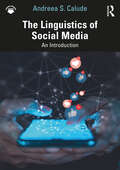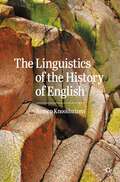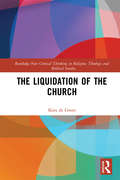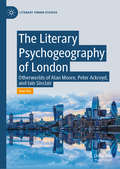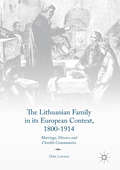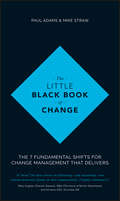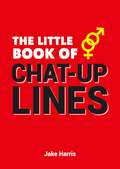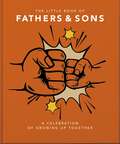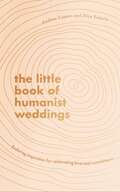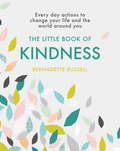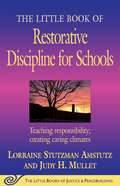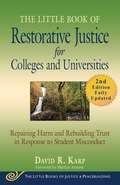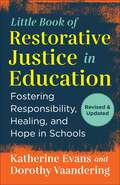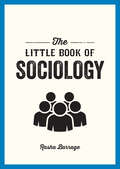- Table View
- List View
The Limits of Organizational Change
by Herbert KaufmanThe environment of modern organizations is so complex and volatile that we take for granted that organizational change is necessary for organizational survival. Yet the literature on organizations has for years described manifold obstacles to such change. First published in 1971, this book extracts from that literature and from experience a comprehensive yet concise overview of those barriers. Because these elements of the analysis are as valid now as when they were originally written, The Limits of Organizational Change is still widely read and cited nearly a quarter-century later.From the premises of this argument, Kaufman drew a number of conclusions about organizational survival and extinction, age and size, centralization and decentralization, and organizational evolution. Subsequent research and reflection induced him to refine and modify some of those inferences. The modifications are spelled out in a new preface that gives fresh relevance to his findings and his conjectures.Yet The Limits of Organizational Change is not a ponderous, labored work. As one reviewer remarked, it is "a delightful set of essays . . . a review of empirical research in a witty, conversational style. . . ." (The Rocky Mountain Social Science Journal). It is a book one can enjoy as well as profit from, and will be a useful tool for managers, organizational studies scholars, and sociologists.
The Limits of Power: The End of American Exceptionalism
by Andrew J. BacevichFrom an acclaimed conservative historian and former military officer, a bracing call for a pragmatic confrontation with the nation's three major problems: the economy, the government, and the endless wars.
The Limits of Racial Domination: Plebeian Society in Colonial Mexico City, 1660-1720
by R. Douglas CopeExamines how the social class structure in colonial Mexico was much more complex then simple racial divisions between natives and Spanish. Mexico City is chosen as the exemplar because as capital of New Spain it was the most racially diverse population and because it provides a great fertility of sources, which include Inquisition and criminal cases, notarial records, civil and ecclesiastical documents, and parish registers for even the lower classes after about 1660.
The Limits of Rationality
by Roger BrubakerIn The Limits of Rationality Rogers Brubaker explores the intimate and ambiguous interplay between Max Weber's empirical work and his moral vision, between his historical and sociological analysis of the 'specific and peculiar rationalism' of modern Western civilization and his deeply ambivalent moral response to that rationalism. Weber's ideas about rationality are central to his sociological work, and they are central to his moral perspective. But these ideas are neither easily accessible nor easily understandable, in part because Weber never systematized them, in part because his work is usually encountered piecemeal and seldom studied in its entirety. Brubaker reconstructs Weber's rich but fragmented discussion of rationalism and rationalization in a systematic fashion, thereby illuminating his empirical and moral diagnosis of modernity - a diagnosis that remains unsurpassed in pathos and anyalytical power.
The Limits of State Power & Private Rights: Exploring Child Protection & Safeguarding Referrals and Assessments
by Lauren DevineThis book tackles a complex area of law, social policy and social work, providing a comprehensive analysis of the theoretical, practical and legal boundaries of State power following safeguarding and child protection referrals in England. The book examines the history, rationale and implications of the current position, concluding that the balance of power is weighted in favour of the State. The Limits of State Power & Private Rights is ground-breaking in its approach to the subject and its detailed, critical analysis. Traditionally the subject matter of the book is considered within a welfare framework. The analysis in this book argues that a policing agenda is embedded within policy but without appropriate safeguards and controls, creating potentially irreconcilable tension described by the author as the ‘welfare/policing dichotomy’. This book is of importance to academics, lawyers, social workers, policy makers, practitioners and service users. The book is written so as to be accessible to a multi-disciplinary audience, but is sufficiently detailed so as to be suitable for specialists and non-specialists alike in this subject area. The chapters include introductory and contextual sections as well as doctrinal, theoretical and socio-legal analysis. Although the focus is on the English system, the book is equally applicable to the many worldwide jurisdictions adopting the Anglo/American ‘child rights’ based framework of child protection. It is also of use as a comparative work in countries where a family support based system is practiced.
The Limits of Transnationalism
by Markus ThielThrough the application of public opinion, interview, and print-media analyses, this book provides evidence that the state of transnational identification among citizens in the EU as a result of post-Maastricht integration measures, such as the completion of the Common Market, the introduction of the Euro, the initiation of the Common Foreign and Security Policy etc. in the United Kingdom, Ireland, and Germany had limited effects in the member states to the extent that national political cultures and mass media orientations are compatible with the goals of EU integration. Policy recommendations are derived by reviewing the complex relationship between EU policies and structural factors such as immigration, ageing and the mediatization of politics in which European integration occurs.
The Linguistic Landscape in China: Commodification, Image Construction, Contestations and Negotiations
by Yanmei Han Guowen ShangThis book explores the linguistic landscape of various cities in China, systematically examining the intricate relationship among language policy, language ideologies, and visible multilingualism in the public space. Framed in the spatial triad encompassing spatial practice, conceived space and lived space, this study conceptualizes linguistic landscape practices, language policy and residents’ perception as three interconnected dimensions of linguistic landscape to unpack the motives, manipulations, contestations and negotiations behind the language display in China, a highly regulated society that attaches great significance to language planning. Taking the linguistic landscape of key cities as cases, this book demonstrates how linguistic landscape mediates city governance and image/identity construction, ontestations and negotiations in language ideologies, and in what ways the agency of linguistic landscape contributes to the harmony of language life in the multilingual society. The book is unique in three aspects. First, it is the first book with a keen focus on mapping the linguistic landscape in the Chinese contexts. Second, it uncovers the relationship between linguistic diversity on display and macro issues concerning city image construction, language politics and language ideologies. Third, it provides a lens to look into China’s governance of the public space and instrumentalization of multiple languages in the globalized era.
The Linguistic Landscape of Post-Apartheid South Africa: Politics and Discourse
by Liesel HibbertThe appointment of Nelson Mandela as President of South Africa in 1994 signalled the end of apartheid and transition to a new democratic constitution. This book studies discursive trends during the first twenty years of the new democracy, outlining the highlights and challenges of transforming policy, practice and discursive formations. The book analyses a range of discourses which signal how and by what processes the linguistic landscape and identities of South Africa's inhabitants have changed in this time, finding that struggles in South African politics go hand in hand with shifts in the linguistic landscape. In a country now characterised by multilingualism, heteroglossia, polyphony and translanguaging, the author debates where the discourse practices of those born post-1994 may lead.
The Linguistics of Social Media: An Introduction
by Andreea S. CaludeThis accessible textbook introduces concepts and frameworks from linguistics and uses them in the analysis of language on social media. Assuming no prior knowledge of linguistics and with examples drawn from 12 different social media platforms, including TikTok, Twitter (the book was written prior to the X rebrand), Instagram, Facebook and Snapchat, The Linguistics of Social Media: An Introduction provides the tools to unpick how language is used to portray a particular identity, to persuade, to inform, to amuse and entertain, to vent and to complain. Analysing the language of social media highlights the strategies which operate in the messages and posts found on such platforms. Together, these strategies involve a wide variety of language registers, creativity and language play and a wealth of linguistic innovation. By evidencing the many nuanced ways in which people are engaging with social media, this book demonstrates how users of social media are linguistically savvy, strategic and skilled in navigating different genres and registers online. The book is divided into ten chapters, each comprising two parts: Part 1 introduces key linguistic theory and Part 2 consists of case studies with examples from different social media platforms to demonstrate a particular discourse purpose. Each chapter ends with a summary, references, suggested further readings and ideas for activities and discussions. There are multiple-choice questions and a glossary available online as support material. This is the essential textbook for all courses on language and social media, linguistics and language and communication courses.
The Linguistics of Social Media: An Introduction
by Andreea S. CaludeThis accessible textbook introduces concepts and frameworks from linguistics and uses them in the analysis of language on social media. Assuming no prior knowledge of linguistics and with examples drawn from 12 different social media platforms, including TikTok, Twitter (the book was written prior to the X rebrand), Instagram, Facebook and Snapchat, The Linguistics of Social Media: An Introduction provides the tools to unpick how language is used to portray a particular identity, to persuade, to inform, to amuse and entertain, to vent and to complain.Analysing the language of social media highlights the strategies which operate in the messages and posts found on such platforms. Together, these strategies involve a wide variety of language registers, creativity and language play and a wealth of linguistic innovation. By evidencing the many nuanced ways in which people are engaging with social media, this book demonstrates how users of social media are linguistically savvy, strategic and skilled in navigating different genres and registers online.The book is divided into ten chapters, each comprising two parts: Part 1 introduces key linguistic theory and Part 2 consists of case studies with examples from different social media platforms to demonstrate a particular discourse purpose. Each chapter ends with a summary, references, suggested further readings and ideas for activities and discussions. There are multiple-choice questions and a glossary available online as support material. This is the essential textbook for all courses on language and social media, linguistics and language and communication courses.
The Linguistics of the History of English
by Remco KnooihuizenThis textbook approaches the history of English from a theoretical perspective. The book provides a brief chronological overview describing the way in which the English language has changed over time from Old English to Modern English, while subsequent parts adopt a theoretical focus that is thematically organised to deal with the question of how and why English changed in the way it did, including a part addressing some specific contact-induced changes and key topics such as English as a Lingua Franca. Supported throughout with information boxes with empirical studies, the examples given are all drawn from English, but boxes with examples from other languages tie the development of the English language into changes in other contexts and settings. This book is an ideal resource for undergraduate students of the English Language and historical linguistics.
The Liquidation of the Church (Routledge New Critical Thinking in Religion, Theology and Biblical Studies)
by Kees de GrootIs religion dying out in Western societies? Is personal spirituality taking its place? Both stories are inadequate. Institutional religion is not simply coming to an end in Western societies. Rather, its assets and properties are redistributed: large parts of the church have gone into liquidation. Religion is crossing the boundaries of the parish and appears in other social contexts. In the fields of leisure, health care and contemporary culture, religion has an unexpected currency. The metaphor of liquidation provides an alternative to approaches that merely perceive the decline of religion or a spiritual revolution. Religion is becoming liquid. By examining a number of case studies in the Netherlands and beyond, including World Youth Day, television, spiritual centers, chaplaincy, mental healthcare, museums and theatre, this book develops a fresh way to look at religion in late modernity and produces new questions for theological and sociological debate. It is both an exercise in sociology and an exercise in practical theology conceived as the engaged study of religious praxis. As such, the aim is not only to get a better understanding of what is going on, but also to critique one-sided views and to provide alternative perspectives for those who are active in the religious field or its surroundings.
The Literary Psychogeography of London: Otherworlds of Alan Moore, Peter Ackroyd, and Iain Sinclair (Literary Urban Studies)
by Ann TsoThis Pivot book examines literary elements of urban topography that have animated Alan Moore, Peter Ackroyd, and Iain Sinclair’s respective representations of London-ness. Ann Tso argues these authors write London “psychogeographically” to deconstruct popular visions of London with colonial and neoliberal undertones. Moore’s psychogeography consists of bird’s-eye views that reveal the brute force threatening to unravel Londonscape from within; Ackroyd’s aims to detect London sensuously, since every new awareness recalls an otherworldly London; Sinclair’s conjures up a narrative consciousness made erratic by London’s disunified landscape. Drawing together the dystopian, the phenomenological, and the postcolonial, Tso explores how these texts characterize “London-ness” as estranging.
The Lithuanian Family in its European Context, 1800-1914
by Dalia LeinarteThis book investigates marriage and divorce in the nineteenth-century European territories of the Russian Empire. It uncovers the way a peasant community employed unsanctioned marital behaviour, such as cohabitation and bigamy, among others, in order to respond to the external factors that had an impact on the family life, including transmission of inheritance and household structure. Lithuania was part of the Tsarist Empire until 1914. This case study reveals how under often restrictive laws and policies - serfdom up to 1861, and the pervasive role of the Church, in addition to deep-rooted customary practices - women and men manage to normalize their family life. The volume is based on a wide range of archival sources and uncovers familial behaviour both from an individual and community perspectives.
The Little Black Book of Change
by Paul Adams Mike StrawYour go-to-guide to delivering effective and transformative change that lasts All too often, change efforts fail to deliver on their promise. However it is possible to turn an organization around quickly to create a new future -- one where people think and behave differently and deliver extraordinary results together. Whether you are the chairman, a board director or an aspiring senior executive, The Little Black Book of Change provides a practical, concise and insightful guide to understanding your organization and inventing something extraordinary. It is not about 'run of the mill' change programmes. It is about delivering extraordinary results -- something that is not at all predictable. It will be your insight into creating significant shifts in the way people think and behave which can be applied in any area you wish; from improving service levels to cost reductions, innovation or increasing market share. Demystifies organisational transformation in 7 practical steps Based on real business case studies Grounded and accessible, rather than purely from theoretical models or processes The authors have 25 years' experience of implementing and facilitating transformations change
The Little Book of Chat-Up Lines
by Jake HarrisYou remind me of a parking ticket. You've got 'fine’ written all over you.Have you ever been surrounded by hot women and stuck for an opening line?From CLASSIC QUIPS to TOP TIPS on body language and online dating, this little book will help you shake off your fears of making the fi rst move and become a DATING AFICIONADO.
The Little Book of Fathers & Sons: A Celebration of Growing Up Together (The\little Book Of... Ser.)
by Orange Hippo!Homer and Bart. Phil and Luke. God and Jesus. Charles and William. Perhaps no other relationship is as complex, rewarding and ever-changing as that of a father and son. Whether the son becomes a mini-me of the father or rebels entirely, who you grow up to be is inevitably shaped by your father.Over the last 50 years, the relationship between a father and son has changed from being a more distant and emotionally strained one to a more loving, open and honest one, which provides a whole new minefield for fathers to navigate. They're more hands-on than ever before, no longer just the traditional breadwinner and disciplinarian. But this thankfully means the father-son bond is often now stronger than ever, as this book shows.Packed full of facts, quotes and trivia, The Little Book of Fathers and Sons is the perfect insight into this unique relationship, whether the parent or child. Full of wit and wisdom, this is the perfect gift for your old man or little man.
The Little Book of Fathers & Sons: A Celebration of Growing Up Together (The\little Book Of... Ser.)
by Orange Hippo!Homer and Bart. Phil and Luke. God and Jesus. Charles and William. Perhaps no other relationship is as complex, rewarding and ever-changing as that of a father and son. Whether the son becomes a mini-me of the father or rebels entirely, who you grow up to be is inevitably shaped by your father.Over the last 50 years, the relationship between a father and son has changed from being a more distant and emotionally strained one to a more loving, open and honest one, which provides a whole new minefield for fathers to navigate. They're more hands-on than ever before, no longer just the traditional breadwinner and disciplinarian. But this thankfully means the father-son bond is often now stronger than ever, as this book shows.Packed full of facts, quotes and trivia, The Little Book of Fathers and Sons is the perfect insight into this unique relationship, whether the parent or child. Full of wit and wisdom, this is the perfect gift for your old man or little man.
The Little Book of Humanist Weddings: Enduring inspiration for celebrating love and commitment
by Andrew Copson Alice RobertsFrom the authors of the Sunday Times bestseller The Little Book of HumanismA humanist wedding ceremony allows couples the freedom to express their love in a completely personal way - and choose what marriage means to them.In a beautiful collection of insights from humanist celebrants, plus quotes, poems and meditations from humanist writers and thinkers throughout history, The Little Book of Humanist Weddings is filled with inspiration to complement your unique celebration of love and commitment.
The Little Book of Humanist Weddings: Enduring inspiration for celebrating love and commitment
by Andrew Copson Alice RobertsFrom the authors of the Sunday Times bestseller The Little Book of HumanismA humanist wedding ceremony allows couples the freedom to express their love in a completely personal way - and choose what marriage means to them.In a beautiful collection of insights from humanist celebrants, plus quotes, poems and meditations from humanist writers and thinkers throughout history, The Little Book of Humanist Weddings is filled with inspiration to complement your unique celebration of love and commitment.
The Little Book of Kindness: Everyday actions to change your life and the world around you
by Bernadette RussellThe Little Book of Kindness will teach you how to be kind to yourself, to strangers, to those you love, to the world - every day, at every opportunity. Prompted by the seeming hopelessness of the world around her, Bernadette Russell undertook a pledge to be kind to a stranger every day for a year. The experience left her wanting to inspire others. The Little Book of Kindness is packed with fun ideas, practical tips and interactive exercises that encourage you to 'be kind' in every area of life - online, to strangers, to the environment, in your community, to yourself - and change the world, one act of kindness at a time.
The Little Book of Restorative Discipline for Schools: Teaching Responsibility; Creating Caring Climates (Justice and Peacebuilding)
by Lorraine Stutzman AmstutzCan community-building begin in a classroom? The authors of this book believe that by applying restorative justice at school, we can build a healthier and more just society. With practical applications and models.Can an overworked teacher possibly turn an unruly incident with students into an "opportunity for learning, growth, and community-building"? If restorative justice has been able to salvage lives within the world of criminal behavior, why shouldn't its principles be applied in school classrooms and cafeterias? And if our children learn restorative practices early and daily, won't we be building a healthier, more just society?Two educators answer yes, yes, and yes in this new addition to The Little Books of Justice and Peacebuilding series. Amstutz and Mullet offer applications and models. "Discipline that restores is a process to make things as right as possible." This Little Book shows how to get there.
The Little Book of Restorative Justice for Colleges and Universities, Second Edition: Repairing Harm and Rebuilding Trust in Response to Student Misconduct (Justice and Peacebuilding)
by David R. KarpA Practitioner's Reference and Guide to Implement Restorative Justice on CampusHere’s a call to colleges and universities to consider implementing restorative practices on their campuses, ensuring fair treatment of students and staff while minimizing institutional liability, protecting the campus community, and boosting morale, from an associate dean of student affairs who has put these models to work on his campus.Restorative justice is a collaborative decision-making process that includes victims, offenders, and others who are seeking to hold offenders accountable by having them (a) accept and acknowledge responsibility for their offenses, (b) to the best of their ability, repair the harm they caused to victims and communities, and (c) work to reduce the risk of re-offense by building positive social ties to the community. David Karp writes in his introduction, “As a student affairs administrator, I have become deeply committed to the concept and practice of restorative justice. I have experienced how it can work given the very real pressures among campus conduct administrators to manage high case loads, ensure fair treatment, minimize institutional liability, protect the campus community, boost morale in a division with high turnover, and help students learn from their mistakes without creating insurmountable obstacles to their future successes.”
The Little Book of Restorative Justice in Education: Fostering Responsibility, Healing, and Hope in Schools (Justice and Peacebuilding)
by Dorothy Vaandering Katherine EvansA fully revised & updated handbook for teachers and administrators on creating just and equitable learning environments for students; building and maintaining healthy relationships; healing harm and transforming conflict.Much more than a response to harm, restorative justice nurtures relational, interconnected school cultures. The wisdom embedded within its principles and practices is being welcomed at a time when exclusionary discipline and zero tolerance policies are recognized as perpetuating student apathy, disproportionality, and the school-to-prison pipeline.Relying on the wisdom of early proponents of restorative justice, the daily experiences of educators, and the authors&’ extensive experience as classroom teachers and researchers, this Little Book guides the growth of restorative justice in education (RJE) into the future. Incorporating activities, stories, and examples throughout the book, three major interconnected and equally important aspects of restorative justice in education are explained and applied: creating just and equitable learning environments; building and maintaining healthy relationships; healing harm and transforming conflict. Chapters include:The Way We Do ThingsA Brief History of Restorative Justice in EducationBeliefs and Values in Restorative Justice in EducationCreating just and Equitable Learning EnvironmentsNurturing Healthy relationshipsRepairing Harm and Transforming ConflictA Tale of Two Schools: Thoughts and SustainabilityThe Little Book of Restorative Justice in Education is a reference that practitioners can turn to repeatedly for clarity and consistency as they implement restorative justice in educational settings.
The Little Book of Sociology: A Pocket Guide to the Study of Society
by Rasha BarrageIf you've always wanted to know how societies function - and why sometimes they don't - this beginner's guide to sociology has got the essential theories and thinkers coveredSociology has almost limitless scope. From the smallest everyday interaction to the impact of vast systemic change, societies are brimming with fascinating phenomena we all want to understand more clearly.There's never been a more important moment to grasp what's going on around us, and this pocket-sized guide offers an engaging introduction to the key sociological concepts and debates. It includes easy-to-follow coverage of: The origins and development of modern sociology and the influence of foundational figures such as Durkheim, Marx and Weber The major sociological schools or perspectives, from functionalism to feminism How sociologists strive to test their theories ethically and carefully by using scientific research methods The key topics in sociology, including inequality, class, crime, gender and race How sociology can help us tackle new challenges and change our societies - and the wider world - for the better Perfect for newcomers, or anyone seeking a concise breakdown of the subject, The Little Book of Sociology takes all the big ideas and makes them crystal clear.
